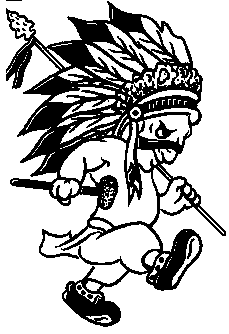I recently asked my 8th grade American history students what immediately came to mind when I said “Native American.” Several mentioned the help Native Americans provided the Corps of Discovery on their expedition to the West, a topic we recently discussed in class. Many of the responses, however, characterized Native Americans in militaristic terms--focusing on warfare, attacks and battles. Additional common responses included “Thanksgiving,” “teepees,” and “hunting bison.” These responses left me disappointed, in part with the limits of my instruction. The history of Native Americans in North America is much richer and more fascinating than just these highly stereotypical glances.
I suspect the other answers reflect the students' long-term, outside-the-classroom notions of Indians. The notions they've been brainwashed with for 10-12 years before reaching a junior-high history class.
And where do they get these ideas? For the umpteenth time, from the mainstream American culture via the media. From countless depictions of Indians at the first Thanksgiving, living in tipis, and hunting buffalo. Not to mention the constant association of Indians with "redskins," savages, warriors, spears, arrows, and tomahawks.
As I've said before, a line extends from products such as Redskin magazine, the Carpinteria Warriors, and the "Go Native" party to stereotypical thinking and thence to racism and hate crimes. The people who contribute to these seemingly "harmless" products may not realize they're harming Indians, but they are.
To stop the harm, stop excusing these products--as non-Indians tend to do--and start thinking critically about them. This is what respecting and honoring Indians really means.
Stereotypes shall remain?
Of course, I'm not giving We Shall Remain a free pass until I see it. Four of the five episodes are set in the distant past. They feature Indians vs. Euro-Americans in conflict with the Indians ultimately losing. I'm not sure these shows will dispel more stereotypes than they reinforce.
If I had the resources, I wouldn't choose to do more historical dramas about the tragic fate of Indians. Even if I wanted to expose people to history, I'd do it from a modern perspective. I'd try to make it something that today's average moviegoer would want to see.
Take the Geronimo story, for instance. You could do a supernatural story about Geronimo's spirit possessing one of his descendants. A murder mystery about the theft of Geronimo's skull and bones. A science-fiction story about traveling back in time to meet Geronimo. An alternative-history story in which Geronimo's forces defeat the US Army.
In short, do these stories always have to be historical dramas that are "good for you"? The kind director Chris Eyre warned us against before he decided to direct a couple of episodes? Answer: No.
Below: "I'm not a primitive savage. Wherever did you get that idea from?"


No comments:
Post a Comment
Note: Only a member of this blog may post a comment.